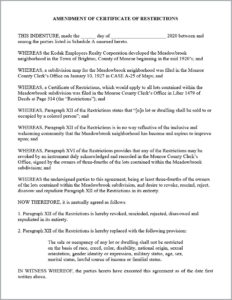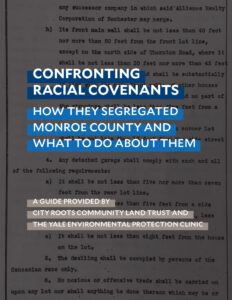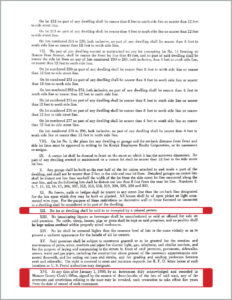We will remember 2020 for many reasons. In Meadowbrook, the CORD initiative will be one of them.
The story of CORD begins in late July with the publication of Confronting Racial Covenants: How They Segregated Monroe County and What to Do About Them (PDF file). That guide made clear how widespread the use of racial covenants was, not just nationally but locally. And it highlighted Meadowbrook, where the deed of every home in the original tract is encumbered with a restrictive covenant that says that “No lot or dwelling shall be sold to or occupied by a colored person.” (As we discuss elsewhere, this language was part of a broader set of laws and social practices that were designed to exclude a wide swath of Americans from neighborhoods like ours.)
In early August, both the Democrat & Chronicle and CITY Newspaper published stories that highlighted that guide and the widespread use of racial covenants throughout Monroe County, and again Meadowbrook was in the spotlight.
In the wake of those stories, Ed Wiltse began a discussion on the Meadowbrook Facebook page with a simple question, “What would it mean to work as a neighborhood toward undoing our sad legacy?” That question sparked a conversation that produced a consensus: That 2020 should be the year in which we begin to undo the damage done by that discriminatory covenant. To the group that came together around this topic, “undoing the damage” meant three things:
- Revoking the discriminatory covenant (PDF file), using the legal process defined by those same deed covenants.
- Formally renouncing that discriminatory covenant and adding ANTI-discrimination language to our deeds to express the spirit of the neighborhood that Meadowbrook aspires to be.
- Undertaking anti-racist initiatives in the community, for example working with the Brighton schools to create a curriculum that helps teach young people about the mechanisms that created the segregated housing patterns we see in Rochester today.
That group now calls itself “CORD” — Confronting our Racist Deeds — and its efforts have been organized by Susan Murphy and led as follows:
- Legal:
Jason DiPonzio - Communication & Community Outreach:
Kimberley Wiedefeld, Kristin Doughty, Gwen Faulkner, Chris Mannelli, and Jim Kane - Signatures and Notaries:
Johnita Anthony and Stacia Rush - Education:
Susan Murphy, Kristin Doughty, and Ed Wiltse - Fundraising:
Devan Katsof

By late September, CORD had formulated a simple deed amendment that addresses the first two objectives stated above, and the work of gathering the needed signatures had begun. On November 1, 2020, the group met its first goal: signatures representing the owners of 75% of the 288 homes in the original Meadowbrook tract. On November 23, 2020, the deed amendment and 225 signature sheets were filed with the Monroe County Clerk’s office. Each signature page, along with a copy of the amendment itself, was returned to the homeowners who signed the amendment.
Moving Forward
Like many Americans at this moment in our history, this group is anxious to not just disavow racism, but to use its collective energy to contribute in some small way to the dismantling of structural racism close to home. From its inception, this group hoped that it might help the Brighton Central School District develop and incorporate some curriculum that would teach students the history of redlining and racial covenants, and how these tangible examples of structural racism helped shape the community in which we live today. The group has found a willing partner in Christine Coyle, the Extended Studies teacher at TCMS, and work on that front continues.
The CORD committee continues to seek other concrete ways to help Meadowbrook be the kind of equitable and inclusive community we aspire to be. To help bring focus and external experience to that exploration, the group hosted a virtual conversation with Shane Wiegand and Conor Dwyer Reynolds, both of whom were key contributors to the Yale report that helped spark the birth of CORD. Click here to watch the recording of the Zoom meeting. (Use passcode Kk?.0jD5 to gain access.)
If you’d like to get involved with the CORD committee and their ongoing work, please contact them at meadowbrookcord@gmail.com.
This page was last updated in the spring of 2021.
For further updates, please visit the new CORD website: https://www.meadowbrookcord.com


